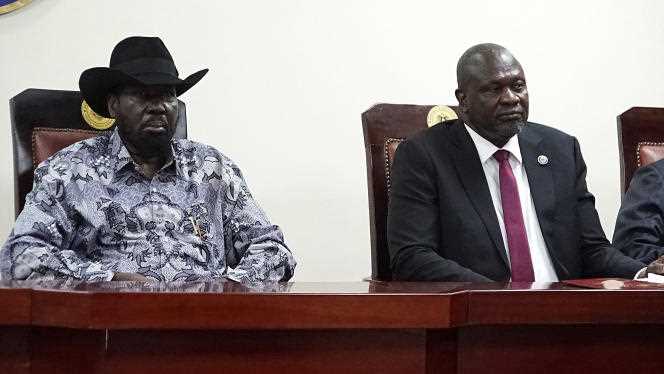Rival South Sudanese leaders pledged a key military provision of the fragile 2018 peace deal on Sunday (April 3rd) after neighboring Sudan mediated in Juba, an AFP journalist noted. President Salva Kiir and Vice President Riek Machar have agreed to form a unified armed forces command, one of many unresolved issues blocking the implementation of the 2018 pact to end five years of civil war murderous.
“Peace is a matter of security and today we have [atteint] an important step », said Martin Abucha, who signed the agreement on behalf of Mr. Machar’s opposition party, the SPLM/A-IO. Presidential Affairs Minister Barnaba Marial Benjamin hailed the agreement as a “necessary step […] which paves the way for a stable government of the Republic of South Sudan”. “It is about informing everyone that we are for peace and that we must all work for peace”added Tut Gatluak, a security adviser to President Kiir.
The two strong men of the country were present on Sunday during the signing ceremony of the agreement in the capital, which provides for a distribution – 60% for the camp of the president and 40% for that of Machar – of the management positions in the army, police and national security forces.
Mohamed Hamdan Daglo, currently number two in the Sudanese council in power after the October 25 coup in Khartoum, arrived in Juba on Friday to try to find solutions within the framework of the security provisions resulting from the peace agreement. This mediation made it possible to reach a consensus, while Mr. Kiir had published a presidential decree on March 25 on the formation of the command structure, quickly rejected by Mr. Machar, who denounced an initiative “unilateral”.
A country in chaos
Tensions between forces loyal to Salva Kiir and former rebel leader Riek Machar had escalated again recently, raising international fears of a return to full-scale conflict in the world’s youngest nation. At the end of March, the SPLM/A-IO withdrew from the body responsible for monitoring the application of the peace agreement, accusing the army and forces loyal to the Head of State of regularly carrying out attacks against its bases.
Since gaining independence from Sudan in 2011, the country has been plagued by politico-ethnic violence and chronic instability that have prevented it from recovering from the bloody civil war that claimed nearly 400,000 lives and 4 million displaced between 2013 and 2018. The 2018 peace agreement provides for the principle of power-sharing within a government of national unity, formed in February 2020 with Kiir as president and Machar as vice-president. But it has gone largely unenforced and their rivalry persists, leaving the country in chaos.
According to a joint report by the UN mission in the country (Minuss) and the UN Human Rights Office published in early March, at least 440 civilians were killed between June and September 2021 in the region of Tambura (southwest) during fighting between pro-Machar factions and the army loyal to Salva Kiir. More than 2 million South Sudanese have fled the country in what constitutes “the biggest refugee crisis in Africa”according to the UN Refugee Agency (UNHCR).
To not miss any African news, subscribe to the newsletter of “World Africa” from this link. Every Saturday at 6 a.m., find a week of news and debates covered by the editorial staff of the “World Africa”.
